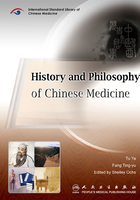
上QQ阅读APP看书,第一时间看更新
Yin and Yang
Yin and yang are significant concepts that are unique to Chinese philosophy and the foundation of traditional Chinese medicine.
The original meaning of yin-yang was related to the description of sunlight. Later, it was described as “dipolar opposition”, an intuition based on observation of universal phenomenon. Together with other terms such as upper and lower, static and dynamic, soft and firm, male and female, good and evil, yin-yang represents two opposing objects or two opposite aspects within a single object. Its defnition is defned in the book Expounding of the Book of Changes ( Yì Zhuàn, 易传), which says, “yin and yang form the Tao (way/patern). ”
Traditional Chinese medicine is based upon yin-yang and its implications. “Yin and yang are the Tao of the heaven and earth, the principle and plan of all things, the parents of all changes, the origin of birth and death, and the source of all mysteries and in the treatment of diseases yin and yang must be considered first.” [1] ( The YellowEmperor’s Inner Classic) Within the fields of philosophy and in medical knowledge, the concepts of yin and yang overlap, but are not identical, reflecting the complex connection between traditional Chinese medicine and philosophy. Their mutual permeation, promotion and restriction also reflect the close relationship between philosophical theory and particular fields of scientific inquiry.
For thousands of years, yin-yang has been a fundamental category of thought and inquiry in China that has influenced almost every area of life. The early formation of the concept of yin-yang also spurred the early development of medicine and shaped its future course. From the original, simple observation of the movements of the sun, yin and yang expanded into a powerful mode of thinking that represents a significant achievement in human thought.
The yin-yang theory in traditional Chinese medicine is a model of yin-yang dialectics that has been successfully applied since ancient times. This traditional category of thought has been applied to the areas of principles, methods, formulas and medicinals in medical practice. In short, if we survey the entire scope of traditional Chinese culture and philosophy, we find that the theory of yin-yang finds its complete expression only in medicine. Historically, in comparison with its role in other fields, the theory of yin-yang as it is embodied in traditional Chinese medicine directly inherits and carries forward the concept of yin-yang from philosophy.
To summarize, the philosophical category of yin-yang has its limitations and can be excessively vague when applied to real-life situations. When it is used in the medical field it has its advantages and limitations as well. Nevertheless, we find two processes at work simultaneously: on the one hand yin-yang is no longer a vital part of the worldview of modern Chinese people, and on the other hand, yinyang continues to be utilized and revitalized in the theory and practice of Chinese medicine.